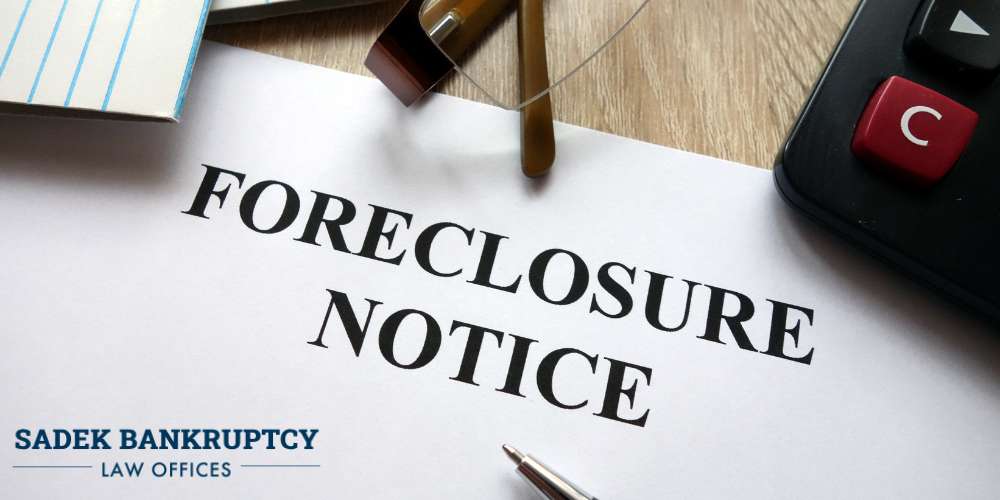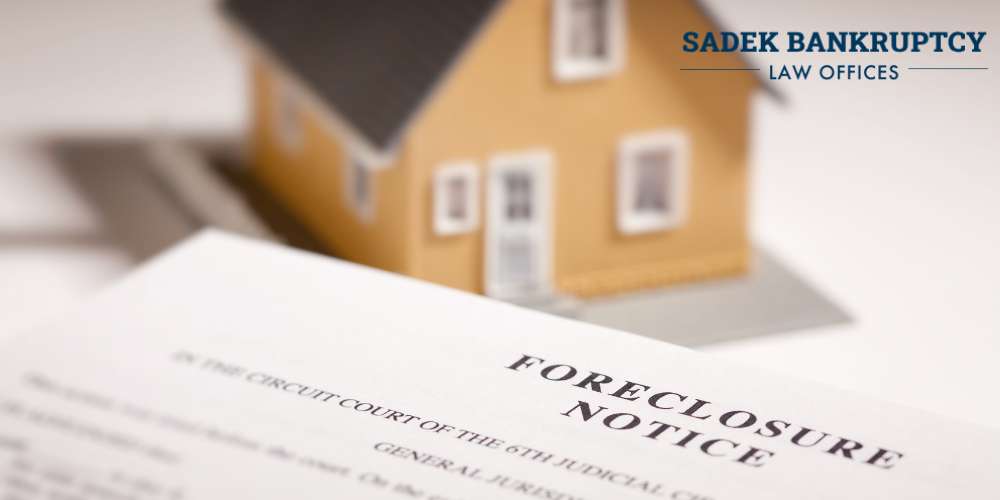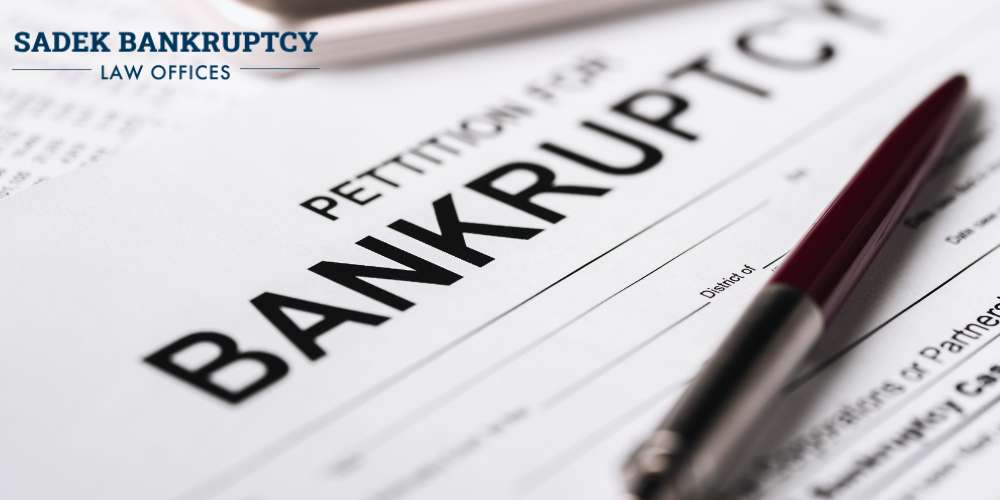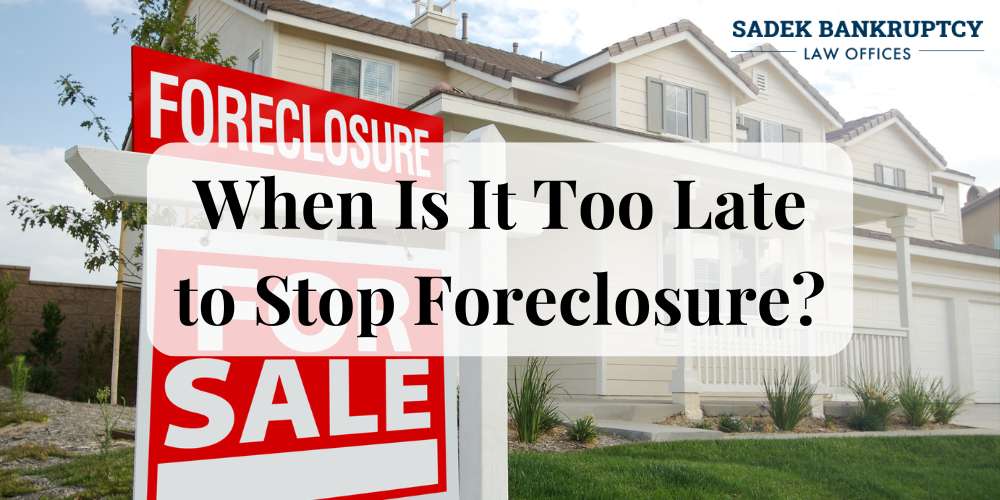Facing foreclosure on your home can feel like navigating a storm with no end in sight. The looming uncertainty and financial strain can be overwhelming. But when is it too late to stop foreclosure? This question weighs heavily on many homeowners in Pennsylvania and New Jersey as they grapple with the reality of impending foreclosure.
Understanding the process and legal options available can make all the difference in safeguarding your home and financial stability. The team at Sadek Law is here to give you the knowledge and support you need to make informed decisions about your financial future. Our Pennsylvania and New Jersey bankruptcy lawyers will keep you informed of your rights and help you protect your most valuable assets. To schedule a free consultation with us, please call our office at 215-545-0008 or schedule online.
What Is the Foreclosure Process?
The foreclosure process starts when a homeowner falls behind on mortgage payments. The lender issues a pre-foreclosure notice to the homeowner, informing them of the default and usually giving them a chance to catch up on payments or resolve the issue.
If the homeowner fails to address the missed mortgage payment, the lender may proceed with the judicial foreclosure process. This involves taking legal action through the court system to repossess the property. Once recovered, the lender can then sell the property at auction to recover the outstanding loan balance.
Mortgage Payments Foreclosure vs Tax Lien Foreclosure
Mortgage foreclosures and property tax foreclosures are two distinct legal processes for reclaiming property. A mortgage foreclosure happens when a borrower defaults on their monthly payments for their mortgage. The lender seizes the property and sells it to recover the missed mortgage payments and outstanding loan balance.
A property tax foreclosure happens when the homeowner fails to pay property taxes on the home. The government or local municipality can take legal action to recover the unpaid taxes by seizing and selling the property. In short, mortgage foreclosures are driven by unpaid loan obligations, while property tax foreclosures address unpaid property taxes.
When Does Foreclosure Start?

Depending on the terms of the mortgage agreement, foreclosure proceedings could begin after only one missed mortgage payment. In most cases, foreclosure typically begins after a homeowner has missed several payments. Most lenders are willing to work with borrowers after the first missed payment, but communication is key.
After missing one monthly payment, the lender may give the borrower an opportunity to resolve the delinquency. If the homeowner has run into financial hardship, they may be able to arrange a payment plan or explore loan modification with their lender. A Philadelphia loan modification attorney can help analyze your situation and recommend the best course of action moving forward.
How Many Late Payments Before Foreclosure?
Typically, the foreclosure process starts after anywhere from three to six months of missed mortgage payments. The number of late payments before the lender files for foreclosure varies by lender and loan type. It’s important to remember that most lenders begin by issuing a notice of default and giving the homeowner a chance to catch up on payments.
How Long Does Foreclosure Take?
On average, it takes six months to a year from the initiation of the foreclosure process until the property is sold at auction. However, the timeline can vary if the homeowner contests the foreclosure or if there are delays in the legal process. Borrowers have opportunities to negotiate with the mortgage company on alternatives to foreclosure. They may also speak with an attorney to seek alternatives such as bankruptcy. Overall, the foreclosure process varies depending on many factors.
Can You Stop a Foreclosure?

Yes, it is possible to stop foreclosure. However, timing is of the utmost importance. When foreclosure begins, homeowners have several options to avoid foreclosure. You may be able to negotiate with your lender or explore other legal options. Early intervention is key. The sooner you address the issue, the more likely you are to find a solution and potentially stop the foreclosure process. An attorney can help you find an effective legal solution quickly.
How to Stop Foreclosure
Filing bankruptcy can be a powerful tool to avoid foreclosure and protect your home. Bankruptcy puts an immediate halt to foreclosure proceedings, giving you the breathing room you need to work out a solution with your mortgage lender. Filing for bankruptcy triggers the automatic stay that halts all collection activities, including foreclosure. This allows you to explore your options and potentially negotiate more favorable terms with your lender.
File for Chapter 7 Bankruptcy
If you are facing foreclosure and file for Chapter 7 bankruptcy, it can temporarily stop foreclosure proceedings through the automatic stay. Chapter 7 discharges most unsecured debts and provides immediate relief by stopping the foreclosure process. However, this relief is often short-lived if borrowers cannot catch up on overdue mortgage payments. Homeowners may be better off filing for Chapter 13 if they want a higher chance of keeping their home.
File for Chapter 13 Bankruptcy
Chapter 13 bankruptcy can offer a more sustainable solution for stopping foreclosure. It allows filers to create repayment plans to address missed payments over a period of three to five years. This plan consolidates your debts and lets you make manageable mortgage payments while catching up on the overdue amounts. Sticking to the repayment plan will allow you to avoid foreclosure and keep your home.
How Long Will Chapter 13 Delay Foreclosure?
Chapter 13 can delay foreclosure for the duration of the repayment plan, which lasts between three and five years. The automatic stay triggered by filing prevents the mortgage lender from proceeding with the foreclosure sale. This allows you time to catch up on missed payments through a structured repayment plan. As long as you adhere to the repayment plan and make all payments on time, you can save your home from foreclosure.
How to Stop a Foreclosure Auction Immediately

The best way to stop a foreclosure sale immediately is to file for bankruptcy. When you file for bankruptcy, you are granted an automatic stay. This stay stops all foreclosure proceedings and prevents the foreclosure sale from taking place.
It also stops all other collection activities, including actions by mortgage lenders to seize your property. Initiating bankruptcy will let you quickly stop the foreclosure auction and gain the time you need to resolve your financial issues and save your home.
How Long Can You Stay in Your House After a Foreclosure Auction?
After a foreclosure auction, borrowers only have a certain amount of time before they must move out of the home. Typically, once the mortgage lender forecloses and the property is sold at auction, the new owner will issue a foreclosure notice or eviction notice. This notice will outline the timeline for vacating the property.
Depending on the legal requirements in your area and any negotiations with the new owner, you may have a few weeks to a few months to leave the home. It’s important to speak with an experienced Philadelphia bankruptcy lawyer about your situation to better understand your rights and options.
Can I Stop a Foreclosure by Paying the Past Due Amount?
Paying the past due amount or any unpaid property taxes could stop a foreclosure, but it depends on what stage of the process you’re in and your lender’s terms. If it’s early in the process, paying what you owe may stop foreclosure. You may also be able to negotiate a loan modification with your lender early in the process.
Waiting too long to address missed payments could lead to it being too late to stop foreclosure. Contact an attorney with Sadek Bankruptcy Law Offices to explore your legal options for saving your home.
My House Was Sold at Auction. Can I Get It Back?
If your house was sold at public auction during the foreclosure process, it is extremely challenging to get it back. You will likely have limited options for reclaiming it. You may still have a redemption period under certain state laws.
The redemption period would allow you to repurchase the property at full sale price plus any additional costs. Alternatively, you could negotiate with the new owner. An attorney can help you explore potential pathways to regain ownership of your home.
How to Stop Foreclosure at the Last Minute
If you’re staring down the barrel of a foreclosure auction, you may wonder, “When is it too late to stop foreclosure?” Last-minute solutions can be challenging to find without legal help. Consulting with a Pennsylvania and New Jersey bankruptcy attorney is critical. We will assess your situation and determine if bankruptcy can help save your home.
By filing for bankruptcy, you gain the legal protection of the automatic stay. This stops foreclosure proceedings in their tracks and prevents the mortgage company from continuing with a sale. With such robust legal protection, you can buy valuable time to negotiate with your lender or find another solution.
When Is It Too Late to Stop Foreclosure in Pennsylvania?
In Pennsylvania, homeowners have until up to one hour before bidding starts at the foreclosure auction to reinstate their property. This is true for both property tax foreclosure and mortgage foreclosure. The legal process of reinstatement can be confusing, so it’s important to work with an attorney to ensure your rights are protected.
When Is It Too Late to Stop Foreclosure in New Jersey?
In New Jersey, homeowners have up until the entry of a final judgment on a mortgage foreclosure or tax lien foreclosure to cure a default. Curing a default means catching up on mortgage arrears to stop the foreclosure process. However, making a lump sum payment like this may not be an option for everyone. Bankruptcy is an effective alternative that can help you save your home and eliminate your debt.
I Got a Foreclosure Letter – Now What?

When you first receive a foreclosure notice, it’s important not to panic. It can feel overwhelming to receive this notice after struggling with missed monthly payments, but there’s hope and help available. Sadek Bankruptcy Law Offices can help you stop property tax foreclosures, stop mortgage foreclosures, and get some much-needed financial breathing room.
The sooner we act on saving your home, the better chance you’ll have of keeping it. One popular option for those overwhelmed with debt is bankruptcy. While we realize many people fear filing for bankruptcy, we advocate for it as a powerful legal solution for debt. Bankruptcy gives you the protection of the automatic stay, which stops all collection activities and creditor harassment in its tracks.
Call Sadek Bankruptcy Law Offices for Foreclosure Defense in Pennsylvania and New Jersey
As we’ve learned, the timing of when it’s too late to stop foreclosure is critical, and understanding your options early can make all the difference. From filing for bankruptcy to negotiating with your mortgage lender, we can help you explore strategies that will help you avoid foreclosure.
If you’re facing the threat of losing your property, don’t hesitate. Contact Sadek Bankruptcy Law Offices today. Our experienced team is ready to help you with no upfront legal fees, supporting and guiding you through this challenging process. To schedule your free consultation with our law firm, please call our office at 215-545-0008 today.





